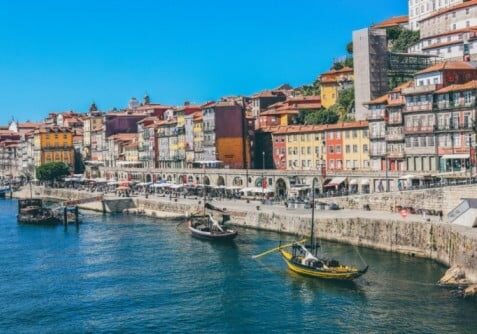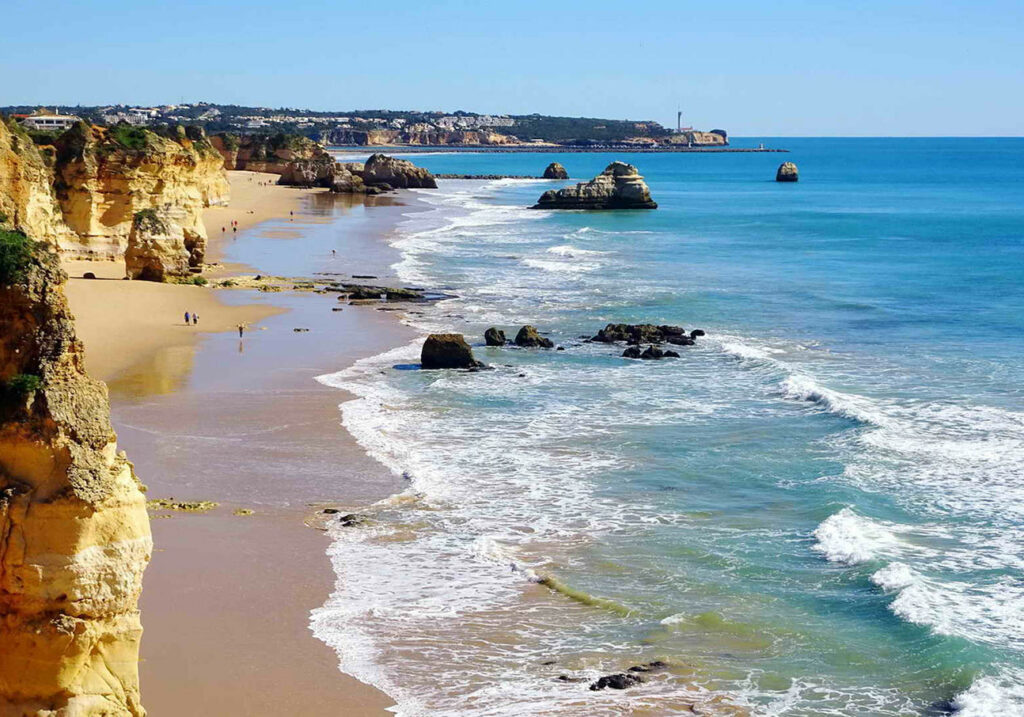In recent years, Portugal has become a popular destination for Americans looking to escape the fast-paced lifestyle and high cost of living in the United States.
It’s not just Americans who are making a move; it’s also been increasingly common for expats from elsewhere in Europe, South America, and China to move to Portugal in the past few years. This article will give you an idea of how much you’ll need to live a good life in the country.
The cost of living difference between Portugal and the USA makes the decision to move to Portugal that bit sweeter, and is a big factor for so many expats moving from the US to Portugal.
In this article, we’ll cover everything you need to know about the cost of living in Portugal, including:
Cost of Living in Portugal vs USA: What to Expect

Bonus tip: Want to learn more about being an expat in Portugal? Read our guides for expats in Portugal.
Portugal ranks 13th in Global Citizen Solutions’ pioneering Quality of Life Index, while the US comes in at 39th. Our index factors in the cost of living, alongside sustainable development goals, levels of freedom, happiness levels, migrant acceptance, and environmental performance.
According to the latest figures at Numbeo, consumer prices, including rent, in the United States are around 74 percent higher than in Portugal. The average price for eating out is around 91 percent higher in the US than in Portugal, and grocery prices are 89 percent higher in the US.
Eating out, buying quality ingredients, and renting a property in Portugal are significantly cheaper in Portugal than in the USA.
Living Expenses in Portugal vs USA
Groceries
Grocery shopping is fairly affordable compared to the USA, especially when it comes to buying fresh produce like fruit and vegetables, fresh seafood, and meat. The general rule of thumb is that you can expect to pay a reasonable price for anything grown, caught, or produced in Portugal, including items that are often considered luxuries in other countries, such as port wine and olive oil. For example, a kilogram of apples might cost around €2.20 ($2.45) in Portugal but $5.64 (€5.10) in the US.
Interestingly, Portugal might be the cheapest European country to live in, but brand-name products are more pricey in Portugal than in other countries. Items like cereals, toothpaste, and cleaning products can be more expensive in Portugal than in the US.
Product | Portugal | United States |
Milk (regular), (1 liter) | €0.81 | €0.95 |
Loaf of Fresh White Bread (500g) | €1.23 | €3.23 |
A Dozen Eggs (regular) (12) | €2.32 | €4.60 |
Apples (1kg) | €1.87 | €4.47 |
Chicken Fillets (1kg) | €6.00 | €10.97 |
Beef Round (1kg) (or Equivalent Back Leg Red Meat) | €9.75 | €13.88 |
Local Cheese (1kg) | €8.12 | €10.48 |
Domestic Beer (0.5-liter bottle) | €1.09 | €2.48 |
Bottle of Wine (Mid-Range) | €4.00 | €11.94 |
Alcohol
Alcohol is considerably cheaper to buy in Portugal than in the USA. For example, a decent bottle of wine will set you back €5.50 in Portugal, but in the US, this would cost around €16.
Meanwhile, domestic beer costs €1.40 in Portugal and over €2.50 in the US. You’ll also find places in Portugal where you can buy a small domestic beer for around €0.60.
Eating out
With a wide range of delicious food available, Portuguese people love to eat out; it’s a huge part of the local culture, and luckily, it’s very affordable. Many Americans expats in Portugal can afford to eat out a few times a week.
A lunch menu at a pastry shop (pastelaria) costs around €5, but you can usually get toasties for about €2 – €3. You can also enjoy lunch in a cafe, including wine and coffee, for between €7 and €12. A coffee, especially an espresso (bica), costs €0.50 or less in rural towns. Even in the capital, an espresso rarely costs more than €1.
At an inexpensive restaurant, you can enjoy dinner for less than €10. Meals at traditional Portuguese restaurants called tascas are very reasonable.
If you want to dine out at a trendier mid-range restaurant, expect to pay around €35 to €40 for a two-course meal for two people. In the US, a typical meal out costs around €65.
Transportation
Local transport costs in Portugal are generally cheaper compared to the US, with some exceptions.
In terms of car costs, gas/petrol per liter costs €2 in Portugal, while it costs €0.97 in the United States. To purchase a new car like a Volkswagen Golf (or an equivalent new car) is actually slightly more expensive in Portugal than in the States.
However, public transport in Portugal is much cheaper than in the US. The monthly cost of a local public transportation pass is €44 in Portugal and €80 in the United States. However, this, of course, will depend on the state.
Education
If you’re considering moving over with children, or if you are considering enrolling in university, you might be wondering how expensive Portugal’s education system is. Basic education in Portugal’s public school system is free.
However, many expats choose to send their children to private schools as the country has many top international schools. Portuguese universities are fairly affordable, as is the case with most European third-level institutions.
Portugal has free public schooling for all citizens and foreign residents. With this said, instead of public schools, many expats choose to send their children to international schools in Portugal, which cost upwards of €6,000 per year.
Fees change depending on the school and grade your children are enrolled in.
In the United States, the national average private school tuition fees are around €9,394.60, and private elementary school averages at €8,492.72 per year.
Traveling
Traveling around Portugal is very affordable. As one of the cheapest countries in Western Europe, you can explore the country’s nature, its rolling hills, its beautiful beaches, and its historical towns for as little as Є80 per day, depending, of course, on the type of accommodation you’re staying in.
Within Portugal, a train ride from Lisbon to Faro typically costs €20 euros one way.
In contrast, traveling within the United States costs more. You usually need around $224 daily for accommodation, food, and sightseeing.
In Portugal, you will also find affordable taxi fees. The average taxi fee per km is €0.75. You can also save money through the low-cost public transport infrastructure. Buses and trains are cheaper than in the US. A cross-country train ticket known as the Portugal Rail Pass gives you unlimited travel for three or seven days in a month as of the date of purchase. For three days, adults pay €73, and children pay €36.50.
Healthcare
Portugal boasts an excellent public healthcare system. While it’s not entirely free, you won’t go into debt paying medical fees. Portugal’s healthcare system is also one of the best in the world.
Portugal ranked 25th in the 2023 Health Care Index by Numbeo, meaning that it has one of the best healthcare systems in the world. Healthcare in Portugal is under a hybrid system with excellent public and private services. The World Health Organization (WHO) ranked Portugal 12th place in their ranking of healthcare systems. Many healthcare professionals speak English, particularly in the private sector.
Under the Portuguese healthcare system, children and seniors receive free medical care. Everyone else must pay a small contribution. To give an example, essential medical services such as a visit to an emergency department can cost €15.
To better understand the healthcare costs in Portugal compared to the USA, check out our comparison table below.
Private health insurance in Portugal
Private health insurance is cheaper in Portugal than it is in the US. Private healthcare plans in Portugal are available at an affordable cost, as many people (including many expats and Portuguese citizens) use private health insurance to supplement the Portugal public healthcare system. A more comprehensive insurance plan will be more expensive, but private health insurance plans, in general, are far cheaper than in the US.
Housing costs
Housing costs for expats are an important factor in deciding whether you can afford to live in another country. Luckily, renting in Portugal is around 40-50 percent cheaper than in the States.
Rents in small or more remote Portuguese cities start as low as €400 a month for a one-bedroom apartment. However, average rent prices in Lisbon, Portugal, are much more expensive, costing around €900 for a one-bed rental outside the city center or €2,500 for a three-bedroom apartment in the city center.
Buying property
While Portugal’s real estate market has been flourishing in recent years and housing prices have been rising, it’s still possible to find properties that are more affordable than those in the United States. If you want to buy property in Portugal‘s major cities, you can find small properties going for €3,207 per square meter in the outskirts.
Depending on location, condition, and the type of property you’re looking at, prices may go up to €500,000.
Note that the average size of apartments in Portugal is notably smaller than in North America.
Utilities
In Portugal, utilities like electricity, heating, water, and garbage collection for a mid-size apartment cost around €150 per month. Of course, this depends on whether you’re using air conditioning every day during the hot summer months or using the heating during the mild winters. Do note that it can get quite cold inside in the winter months if you don’t have good insulation, so make sure you have a sound heating system.
In the United States, utilities are roughly 52 percent more expensive, averaging €190 per month. A pre-paid mobile tariff is about the same price in Portugal as it is in the US.
Portugal Cost of Living vs US: Capital City Comparison
To get a clearer picture of the difference in cost of living and get some insight into monthly expenses, we will compare the cost of living in Lisbon with Washington, DC.
- Consumer prices in Lisbon are 39.1 percent lower than in Washington, DC (without rent)
- Consumer prices including rent in Lisbon are 41.9 percent lower than in Washington, DC
- Rent prices in Lisbon are 46.2% percent lower than in Washington, DC
- Restaurant prices in Lisbon are 43.6 percent lower than in Washington, DC
- Groceries prices in Lisbon are 44.1 percent lower than in Washington, DC
- Local purchasing power in Lisbon is 58.1% percent lower than in Washington, DC
The cheaper cost of living in Lisbon compared to the cost of living in Washington in these categories gives you an idea of how you can save money by moving to Portugal, but let’s go into a bit more depth about how much things cost in Lisbon to give you the full picture.
Estimated monthly costs in Lisbon city center
Lisbon is seen as a good place to live for many expats, though it is more expensive than other cities in Portugal. Here’s an outline of some of the most important costs to bear in mind if you’re considering living in Lisbon.
Rent in Lisbon
Lisbon’s rent varies depending on factors like location, size, and amenities. Here’s a general idea:
- One-bedroom apartment: Averages €1,500+ per month.
- Two-bedroom apartment: Expect a range of €1,850-€2,000+ per month.
- Three-bedroom apartment: Typically starts around €1,800+ and can go much higher depending on luxury features.
Cost of living in Lisbon for students

Total: Around €775 per month (excluding tuition fees).
Accommodation: This is the biggest expense. Sharing a room can cost €350-€500, while a one-bedroom apartment might be €700-€900+. University dorms can be cheaper, starting at around €400.
Food: Eating out is affordable. Groceries average €90 monthly, while a mid-range restaurant meal could be €10-€15.
Transportation: Public transport is efficient with a monthly pass costing around €68.
Cost of living in Lisbon for a family
Accommodation will be the biggest expense. Renting a three-bedroom apartment suitable for a family can range from €1,800+ per month and climb even higher depending on location and amenities. A family of four can expect monthly costs around €2,200, which covers groceries, utilities, clothing, and basic entertainment.
Groceries: €200-€300 per month is a reasonable estimate for groceries, depending on your eating habits.
Utilities: Expect around €100-€150 per month for utilities like electricity, water, and garbage collection.
Transportation: Public transport passes cost around €68 per month per adult. Children might have discounted fares.
Eating out: Mid-range family meals at restaurants can range from €30-€50.
Internet: Basic internet plans start at around €40 per month.
These are estimates, and your actual costs will depend on your lifestyle choices. Consider additional expenses like childcare, which can be quite expensive in Lisbon, especially for international schools.
The cost of eating out in Lisbon

In Lisbon, dining experiences can range from budget-friendly to extravagant, accommodating various preferences and budgets. While a meal in an inexpensive restaurant may cost around €10, exploring local tascas could yield satisfying lunches with coffee and dessert included for €7 or €8.
Mid-range establishments typically offer meals with wine for approximately €20, while luxury dining options align with international pricing, including Michelin-starred restaurants scattered throughout the city.
Whether seeking a leisurely morning coffee, a quick lunch spot, or an adventurous culinary journey, Lisbon promises to fulfill your desires. Moreover, with the continual emergence of innovative dining concepts, there’s always something new to explore in this vibrant culinary landscape.
Sports and leisure costs in Lisbon
In Lisbon, a variety of leisure and entertainment options await, with generally lower prices compared to other major European cities.
Movie theaters: Whether it’s catching the latest blockbusters at multiplexes like Cinema City Alvalade, discovering independent gems at Cinemateca Portuguesa, or enjoying cult classics at unique venues like Black Cat Cinema, ticket prices typically hover around €8, catering to diverse cinematic tastes.
Concerts: From intimate bar performances priced at €10-€15 to free or affordable open-air concerts, Lisbon offers diverse musical experiences. Historic venues like Coliseu dos Recreios provide grandeur for €20-€30, while classical music events vary from chamber recitals to symphony orchestras, generally falling within the €15-€30 range. Genre-specific events, including soul, electronic, and traditional Fado, offer experiences typically priced between €15-€30, with festival day passes starting at €20.
Sports events: Tickets for soccer games at Estádio da Luz or Portuguese basketball games at Pavilhão João Lobo start around €20-€30. Beyond these major sports, Lisbon caters to various athletic interests, offering options like tennis tournaments, international rugby matches, skateboarding contests, and local running events.
Gym memberships: Monthly gym memberships usually range from €40-50, granting access to modern facilities and diverse workout options such as cardio, strength training, yoga, and swimming. While this pricing is generally lower than in other European cities, it’s worth considering the local salary context, making Lisbon a budget-friendly destination for fitness enthusiasts.
The Cost of Moving to Portugal

Shipping expenses are a considerable cost you must incur if you want to transport your belongings from the United States to Portugal. If you choose to ship from New York to Lisbon, transporting a 20ft container box will set you back around €1,229.11 and take 14 days. If you’re looking to fly your belongings for speed’s sake, the same package will have transportation costs of around €2,705.
On top of this, you must factor in a plane ticket to get to Portugal, which averages around €382 per person one-way (flights are generally more expensive from the west coast of the US than from the east coast.
Moving will always incur extra costs, like putting in a deposit if you’re renting a property, paying for a new phone plan, and buying all the additional goods you may need to help you get settled.
Frequently Asked Questions about comparing Portugal's Living Costs to USA
How much does it cost to live in Portugal?
How much it costs to live in Portugal depends on your budget, lifestyle, and which part of Portugal you choose to live in. For a family of four, estimated monthly costs are around €2,073 on average per month, not including rent.
How expensive is Portugal compared to other countries in Western Europe?
Portugal is relatively inexpensive. In fact, it’s among the countries in Western Europe with the lowest cost of living. This makes Portugal an attractive option for digital nomads, retirees, and other expats from around Europe as well as from the USA.
How much is rent in Portugal?
A decent single-bedroom apartment in Portugal costs around €900 close to the city center and around €590 away from the city center.
What is the cost of living in Portugal vs USA?
Portugal is considered one of the most affordable countries in Western Europe. On average, it is 40.8 percent cheaper to live in Portugal than in the United States.
How can I move to Portugal?
Moving to Portugal depends on your visa status. If you’re an EU/EEA/Swiss national, you can move to Portugal visa-free and with relative ease.
However, if you’re a US citizen, there are visa requirements for Portugal. To get a work visa, you’d need to get a job offer and a work contract from your employer in Portugal and complete all the paperwork. If you choose to opt-in to Portugal’s Golden Visa scheme, you must invest first.
What is the cost of living in Lisbon, Portugal vs California?
To give you some indication of the cost of living in California compared to Portugal, consumer prices in Lisbon (not including rent) are around 38 percent lower than in Sacramento, the capital of California.
If you pay rent in Lisbon, it’s approximately 31 percent lower when compared to Sacramento. Restaurants prices are 41 percent lower, grocery prices are 51 percent lower, and local purchasing power is 55 percent lower in the Portuguese capital, indicating that prices are more favorable across the board in Lisbon.
How much money do you need to live comfortably in Portugal?
Compared to some other countries in Europe, Portugal is exceptionally affordable. A couple with a mid-range income can live comfortably in Portugal’s cities for around €1,900 per month. A couple in Lisbon can live on around €2,500 per month. When it comes to the cost of living in Portugal for a single person, you can get by on €1,200 per month in Lisbon or Porto; costs are even less in a more affordable city such as Coimbra or in Portugal’s smaller towns.
Is it cheaper to live in Portugal or in the USA?
It is cheaper to live in Portugal than in the USA. Compared to other European countries, Portugal is one of the best places to consider in terms of affordability.
What are the pros and cons of living in Portugal?
Portugal is one of the best European countries to live in, regularly ranking high in international living indexes. It has more than 300 days of sunshine a year, a high quality of life, and a low cost of living. Some pros of life in Portugal include excellent education and healthcare (including relatively affordable private insurance options) and welcoming locals.
What is the cost of living in Portugal for a couple?
Depending on your lifestyle, a couple should be able to get by with between $2,500 (€2,332) to $3,000 (€2,798) a month in Portugal outside the main cities. In large cities, particularly in the city center, expect to need a little more. Regardless, Portugal provides one of the most affordable costs of living when compared with other Western European countries, such as the UK, Spain, and France.
What is the cost of living in the Algarve, Portugal?
Living in the Algarve is quite affordable, but the cost of living will depend on your lifestyle and which part of the Algarve that you live in. In general, for €12, you can eat out in an inexpensive restaurant in the Algarve. Renting single bedroom apartment in the city center will cost you around €900, while basic utilities will set you back just over €100 per month. You can find out more in our Living in the Algarve Guide.
What is the cost of living in Portugal versus Canada?
Portugal is considerably more affordable than Canada. Consumer prices in Canada are almost 46 percent higher than in Portugal, rent is 47 percent higher than in Portugal, and restaurant prices are 62 percent higher.
What is the cost of living in Portugal compared to the UK?
Portugal is more affordable than the UK. Consumer prices in the UK are 38 percent higher than in Portugal (without rent), rent prices are around 40 percent higher in the UK than in Portugal, and restaurant prices are around 77 percent higher. Note that this is relative, and the average salary in Portugal is quite low when compared with the UK.
What is the cost of living in Portugal versus India?
Portugal is one of the most affordable countries in Europe. However, when comparing the cost of living between Portugal and India, consumer prices are around 53 percent lower in India than in Portugal (without rent), rent prices are around 77 percent lower, and restaurant prices are around 62 percent lower.
Can you live in Portugal for $1,000 a month?
If you want live frugally in an affordable part of the country, you should be able to live on $1,000 a month. Given the increasing rental prices and housing costs in Lisbon and other major cities, however, it may be difficult to live on $1,000 a month in these parts of the country.
What is the cost of living in Portugal for international students?
Portugal is quite affordable for students. Of course, costs will vary depending on your lifestyle and which part of Portugal you will live in. For a single person, the estimated monthly costs are €595.4 without rent.
Are utilities and internet expensive in Portugal?
Utilities like electricity and water are slightly above European averages, while internet costs run around €30-€50 per month, depending on speed and provider.
How much does it typically cost to dine out or buy groceries in Portugal?
Dining out ranges from budget-friendly €10-15 for lunch to €20-30 for a nice dinner. Groceries are generally affordable, with basic items similar to European averages.
What are the average childcare and education expenses in Portugal?
Public daycare starts around €200 per month, with private options climbing to €500-€700. Education is free through public schools, while universities charge moderate fees. Availability and affordability of childcare can vary across the city.
Is it expensive to maintain a lifestyle in Portugal for expatriates?
Affordability is relative. Portugal offers a charming life at reasonable costs, although salaries may be lower than some European counterparts (the net average monthly salary nationwide is around €1,500-€2,000 per month).
Research cost of living and local salaries (factor in things like whether you will buy health insurance or rely on the public healthcare system) to create a sample monthly budget and assess how much spending money you’d need to maintain your desired lifestyle.
Are utility costs high in Portugal compared to other Western European countries?
Average monthly utility costs in Portugal are around €109.78 per month. These are roughly the same as utility costs in other Western European countries.
What is the average cost of living in Portugal?
A family of four estimated monthly expenses are $2,514.6 (€2,333.8) without rent. A single person’s estimated monthly costs are $712.3 (€661.1) without rent. The cost of living in Portugal is, on average, 36.3 percent lower than in the United States.
Is the cost of living in Portugal low?
Portugal has the lowest cost of living in Western Europe. Especially in minor cities, the cost of living can be exceptionally affordable.
If you live in a major city such as Lisbon or Porto, living costs will be higher. You can expect to spend more money on groceries, utilities, and especially housing.
Can you live in Portugal on $3,000 a month?
Yes, it’s possible to live in Portugal on $3,000 a month, but it largely depends on your lifestyle and location within the country. In most areas, this budget should cover basic living expenses such as accommodation, food, transportation, and utilities, but luxury or high-cost areas may require more careful budgeting.
Can you live in Portugal on $2,000 a month?
Living in Portugal on $2,000 a month is possible, especially in more affordable regions. This budget should cover basic expenses like accommodation, food, transportation, and utilities, though it may require careful budgeting and lifestyle adjustments depending on individual circumstances and preferences.
Is the living cost in Portugal affordable?
Overall, Portugal offers a relatively affordable living cost compared to many other European countries. However, costs can vary depending on factors such as location, lifestyle choices, and individual preferences.
Is Lisbon expensive to live in?
While Lisbon is Portugal’s most expensive city, it remains relatively budget-friendly compared to other European capitals. Rent for a one-bedroom apartment in the city center averages €1,200 per month. Groceries and dining out are affordable, but utilities and transportation costs can add up.



